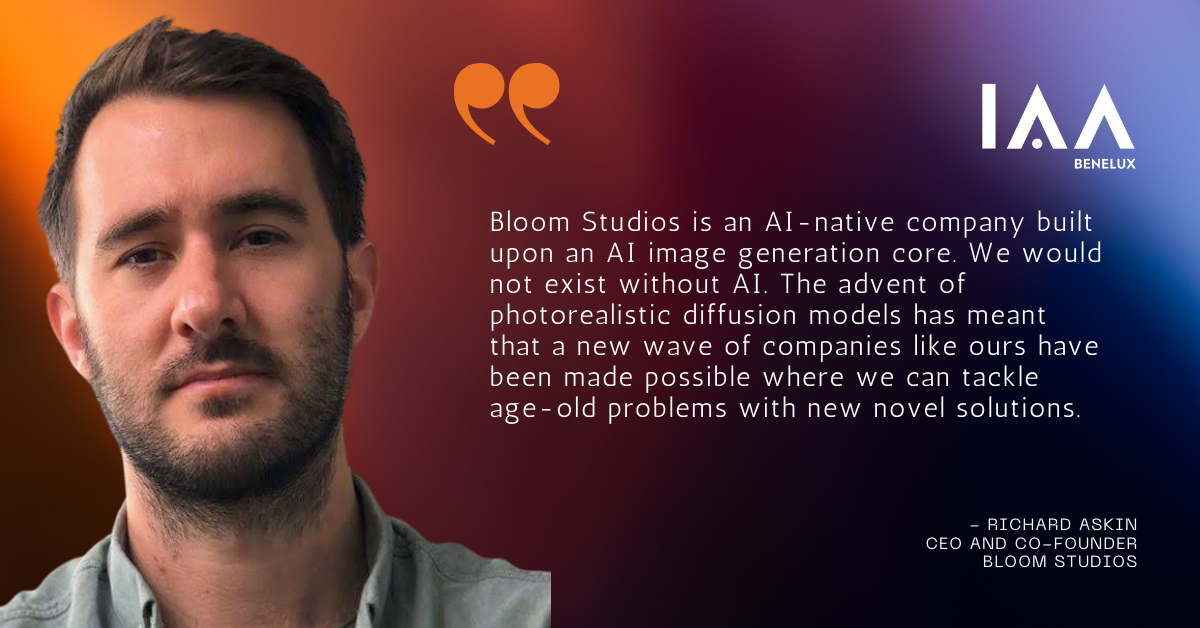We’re excited to to present an exclusive interview with Richard Askin, CEO and Co-Founder of Bloom Studios, an AI-native fashion photography agency. In this interview, Askin explores how Bloom Studios leverages generative AI to tackle traditional media production challenges, while also addressing the ethical considerations and transformative opportunities AI brings to the industry. This conversation sheds light on how AI is not just enhancing, but reshaping the landscape of digital marketing and fashion.
Join us as we hear how AI-native agencies like Bloom Studios are creating new solutions to age-old problems with AI.
IAA Benelux: Has the recent evolution of AI changed anything within your organization, and if so what?
Askin: Bloom Studios is an AI-native company built upon an AI image generation core. We would not exist without AI. The advent of photorealistic diffusion models has meant that a new wave of companies like ours have been made possible where we can tackle age-old problems with new novel solutions. Our business is set up to solve familiar pain points in commercial media production with new approaches using AI.
IAA Benelux: What do you see as the risks of AI for your organization and for the industry as a whole and what is your role / your organization’s role in mitigating those risks?
Askin: AI poses significant risks, especially in consumer-facing media. One of the key risks is relying solely on AI without human oversight. Due to the potential for AI systems to produce unpredictable or “hallucinatory” outputs, there’s a risk of creating content that could harm brand perception or have unintended cultural implications. This is particularly crucial when AI-generated imagery involves human representations.
At Bloom Studios, we mitigate these risks through two key work streams: for mass image production, we’re implementing human-driven reinforcement learning and additional safeguards using computer vision to detect and flag anomalies in content requiring human review.
For bespoke projects, our creative team uses AI intimately, ensuring that human creativity and judgement drive the final output, accelerated by AI.
IAA Benelux: How do you ensure responsibility over AI-systems used within your organization?
Askin: AI is at the core of our operations, and we prioritise human oversight to ensure responsible use. We actively educate our team about the biases inherent in AI models and work to counteract these biases by diversifying our training data.
Our commitment to ethical AI includes ongoing efforts to ‘unlearn’ these biases via extending into more fringe cases trained into our systems, ensuring that our AI models are more equitable and reflective of the diversity in the world.
IAA Benelux: What do you see as the opportunities for the use of AI?
Askin: AI offers unprecedented opportunities to scale content production in ways previously unimaginable. We empower brands to customise, personalise, and localise their content to better engage diverse markets and audiences.
Our approach enables reactive marketing strategies, where we can quickly adapt basic imagery into branded customised campaign content enabling unplanned reactive content deployment.
IAA Benelux: Do you see the industry using AI for the collective good, and if so how?
Askin: AI is being used in two distinctive areas within the image gen domain: aesthetic expansion and operational efficiencies. AI has enabled the shift into new visual areas for high-end advertising, but at the same time enables functional, foundational media to be created more efficiently and at scale, making high-quality content accessible to a broader audience at lower costs.
I think the good that AI will bring to the industry will be in the enablement for anyone, no matter seniority, skill set or means, to conceptualise, visualise and realise new ideas and media into the world at unthinkable speeds. The flipside to this is that there have traditionally been human jobs that serve this process. The coming change will be significant and is arriving at an alarming rate that society is not very well prepared for.
IAA Benelux: How are the regulations around AI, such as the EU AI Act impacting your business in the EU and abroad? Do you see these regulations as opportunities or threats?
Askin: Given that Bloom Studios work involves creating synthetic human representations for brands, we’re deeply conscious of the ethical considerations involved. While the EU AI Act and similar regulations focus on issues like deep fakes, which aren’t directly applicable to us, we do take the underlying concerns about deception very seriously.
We’ve established an internal ethics and safety committee to ensure that our AI-generated content responsibly reflects cultural values, diversity, and other critical human factors. Our position on this is to only depict real people with explicit consent, ensuring consumer transparency and trust in our AI-driven work.
These regulatory environments offer an opportunity for us to share our voice in upholding and driving ethical standards within the AI industry.

